Optimize Your Sleep for Better Health
This post is all about optimizing your sleep to improve everything from relationships, to productivity, to your ability to maintain a healthy body weight. We’ll take a more in depth look at how nutrition, gut health and sleep environment effect the quality of your sleep and what you can do to improve it.
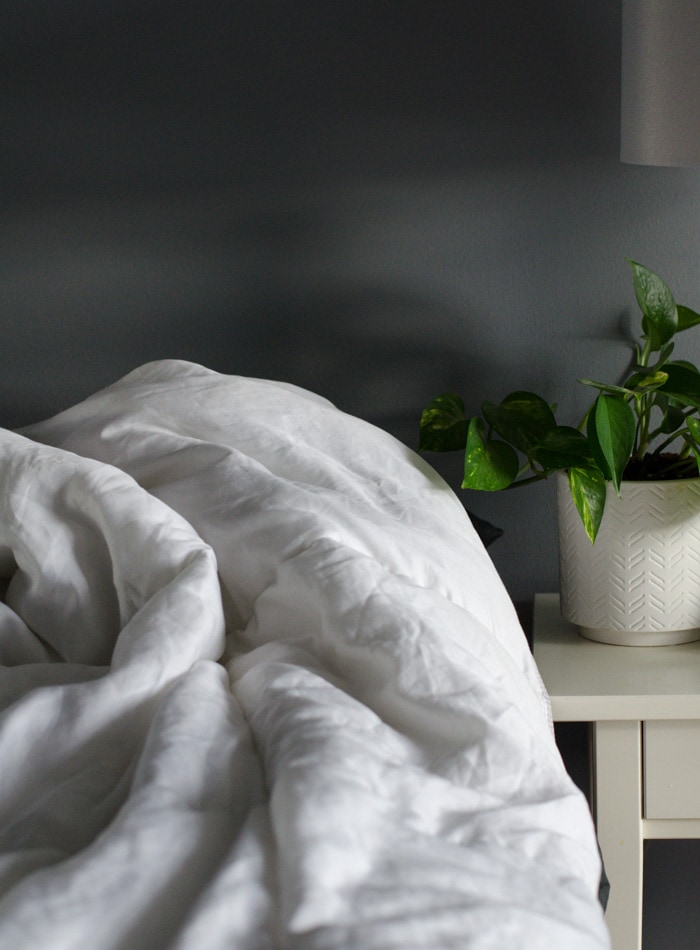
How to get Better Sleep
Alright, let’s get into more details on optimizing your sleep. I really love this topic so this is my second post on creating a great nights sleep. I would recommend reading the first post, Sleep Well: Tips for Better Sleep, in particular, my tips for creating a healthy evening sleep routine. A good evening sleep routine is key to setting yourself up for quality sleep.
What is quality sleep?
When it comes to sleep, quality is just as important as quantity. You could be in bed 8 or 9 hours a night but if only 3 of those are quality sleep, then you’re not getting the recovery you need.
The quality of sleep is everything. Ask yourself: are you surviving or are you thriving? Thriving is feeling your best in every area of your life, and having the energy needed to go after the best version yourself everyday. Thriving isn’t possible without quality sleep.
Quality sleep can be defined by how fast you fall asleep, the sleep disruption we experience throughout the night (which we may not even be aware of if we’re being pulled out of deep sleep but not waking up) and the amount of rejuvenating deep sleep we’re getting.
If you’re getting 8 hours of sleep every night be find yourself falling asleep during the day, chances are you’re not getting enough quality sleep.
Symptoms of Lack of Quality Sleep
- Poor memory. Memory processing happens during deep sleep. During deep sleep, short-term memories are moved to long-term storage. If our brains aren’t getting the chance to do that work, you may be forgetful when it comes to everyday, short-term memory.
- Poor decision making. When we’re sleep deprived, our resolve, willpower and decision-making abilities are compromised. We tend to make poor choices, setting ourselves up for failure. Keeping that in mind, it’s best not to make important decisions with long-term consequences if you’ve been lacking sleep.
- Reduced productivity. It may take us up to 4 times longer to complete tasks when we’re sleep deprived compared to when you’re well rested. There’s no point in trying to skip to sleep to get more done either. The fastest way better performance to is to optimize your sleep to get better rest.
- Reduced recovery. We don’t get stronger when we’re in the gym, the real magic happens when we rest. When we sleep, our bodies are in an anabolic state, or a time for building and repair, rather than the catabolic, breakdown state we’re in during the day.Human growth hormone is secreted while we sleep and it plays a big roll in healing, recovery and muscle growth. Sleep is the magic key to getting the results you want from your workout and nutrition plan.
- Less energy. When we’re sleep deprived, we have less energy and motivation to engage in the leisure actives that help us de-stress and sleep better to begin with, and so begins the endless cycle. We’re tired so we skip exercise, then we don’t sleep as well because we didn’t get enough movement during the day.
- Exercise. Exercise helps up sleep. We’ve gotta tucker ourselves out so we can hit the pillow and pass out! If you don’t have time for a full-blown gym session, get in as much movement as you can during the day. If you’ve been sitting, get up every 30 minutes and do jumping jacks or squats, or go for a quick walk. Use a timer to make sure you’re doing this every 30 minutes. Movement cultivates energy, so if you’re tired, moving is one of the best ways you can naturally boost energy levels.
- Weight gain. A lack of quality sleep creates a viscous cycle in which you’re more prone to factors that contribute to weight gain. We already talked about how willpower and resolve is compromised, making you more likely to reach for unhealthy foods. If we’re tired and stressed, we start looking for ways to calm down and one easy way to do that is by eating sugary, fatty foods. Additionally, we have a harder time dealing with insulin and this affects our blood sugar levels, leaving us even more wiped out than before.
With sleep deprivation our brains go into survival mode, the amygdala takes over (we’ll talk more about that below), and because of this, not only do we crave more fuel but our metabolism slows down in our to maintain resources. Hunger hormones like ghrelin are boosted and leptin, a hormone that signals fullness, is suppressed. If you’re looking to make a positive change to your lifestyle or need to lose weight, improving your sleep quality is just as important as nutrition and exercise.
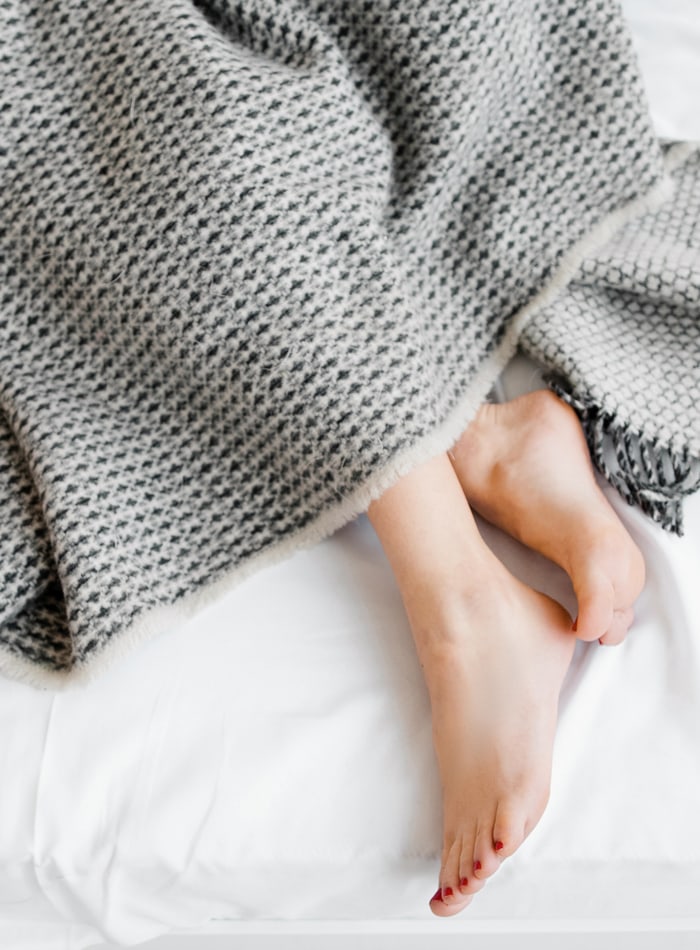
How Sleep Affects Relationships
When we’re sleep deprived, we lose the ability to regulate our mood and we become more reactive to negative emotional stimuli. We’re much more likely to over-react at even the simplest of triggers.
I’m sure you’ve all been there. When you’re sleep deprived, everyday tasks such as the dishes, or things like traffic set you off when they wouldn’t normally phase you. We have a hard time handling criticism and find it difficult to find the positive in any given situation or experience joy at all. Sleep deprivation causes us to experience more fear, anger and depression than when we’re well-rested.
All of these factors make it difficult to cultivate healthy relationships. Sleep deprivation also hinders our ability to experience positive emotions, even after achievements and other successes. When we’re tired, we’re essentially robbing ourselves of happiness.
The Lizard Brain
There are 3 parts of the brain. The amgydala, often called the lizard brain, reptilian brain or primitive brain, the limbic, or emotional brain and the prefrontal cortex, or the part that makes us human. The prefrontal cortex is where we make decision and can think externally to control thoughts and emotions.
When we’re sleep deprived, the lizard brain takes over and the lizard brain only cares about survival. It’s always sizing up threats and getting ready for fight or flight. Because of this, selfishness increases with sleep deprivation. We may start arguing with our partners over the simplest things. It’s also harder to empathize with your partner and this all leads to increased tension and stress in a relationship.
It’s important that both partners get on board with a healthy evening sleep routine. If one partner or the other doesn’t sleep well, both are effected. When we’re well rested, it’s easier to see things from each others perspectives, communication is improved and can experience more happiness and joy, together.
What to Wear to to Bed
Thermoregulation is also important for our quality of sleep. If the body can’t cool itself down at night, you won’t be able to optimize your sleep. The best bet for what to wear to sleep? Well, it’s nothing. Go naked! If you’re not feeling sleeping naked, then lose fitting, cool clothing is your next best bet. Another bonus of sleeping naked? Skin-to-skin contact releases oxytocin, a potent anti-stress hormone.
- Sleep in cool, loose clothing
- Don’t wear anything too tight that could cut off the lymphatic system or circulation
- Don’t wear tight socks, if your feet get cold, wear lose socks that don’t have a tight elastic at the top
- Don’t wear a bra to bed, this can cut off lymph nodes around the armpit
- When in doubt, sleep naked!
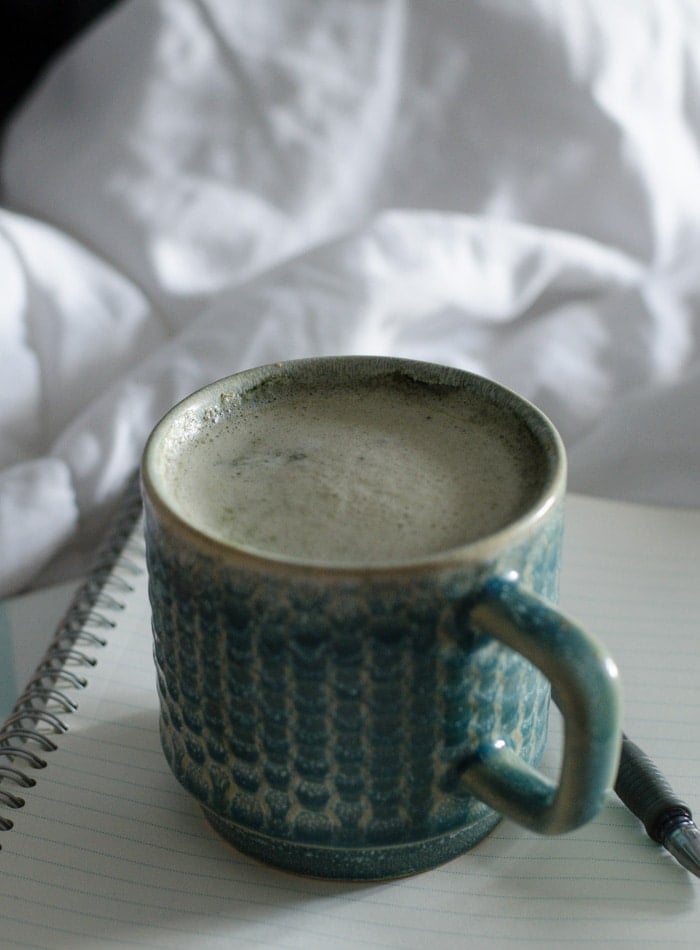
Digestion and Sleep
You might be wondering why we’re going to talk about digestion in a post about optimizing sleep. Well, we now know that high-levels of melatonin and serotonin are found in the gut. In fact, 90% of the body’s serotonin, the feel-good neurotransmitter, is found in the gut.
This is why eating well is not only important for sleep but also for our mental health. In addition to serotonin, the gut has been found to contain 400 times the melatonin than the pineal glad in the brain and furthermore, the inter-endocrine cells can actually produce melatonin themselves.
Knowing that, we can see that we’ve it’s important to optimize our gut health in order to optimize our sleep. What happens in the gut profoundly influences our brain and overall health. Taking care of the gut microbiome should be a health priority. If you experience symptoms such as bloating, gas, stomach pain, are overweigh or have a puffy stomach, then you may have some work to do to heal your gut.
Here are a few steps you can take to promote the diversity of healthy flora in the gut.
First of all, you want to avoid things that are actually killing good gut bacteria, this includes things like:
- Chlorinated water. Chlorine is an antibiotic, kills the bad guys and the good guys along with them, slowly wiping out your micro biome and reducing flora diversity.
- Agricultural chemicals, pesticides etc. Invest in organic foods, follow the dirty dozen and clean 15 lists.
Secondly, you want to encourage good gut bacteria to flourish. You can do this by:
- Eating fermented foods. Try sauerkraut, kimchi, kombucha, kefir, homemade coconut yogurt, aim for 5 servings a week.
- Taking a probiotic.
- Feed them real food. Nourish gut bacteria by eating a range of whole foods the body recognizes.
- Eat prebiotics. Include artichoke, garlic and onions in your diet.
Why a Sleep Schedule is Important
We always hear that we should stick to a sleep schedule, going to bed and getting up at the same time everyday. Digestion works in accordance with our circadian rhythm, helping to regulate appetite and metabolism.
For example, our digestion slows at night so we can sleep without nightly bathroom trips. This is why sticking to a sleep schedule and eating well throughout the day is so important when it comes to optimizing sleep.
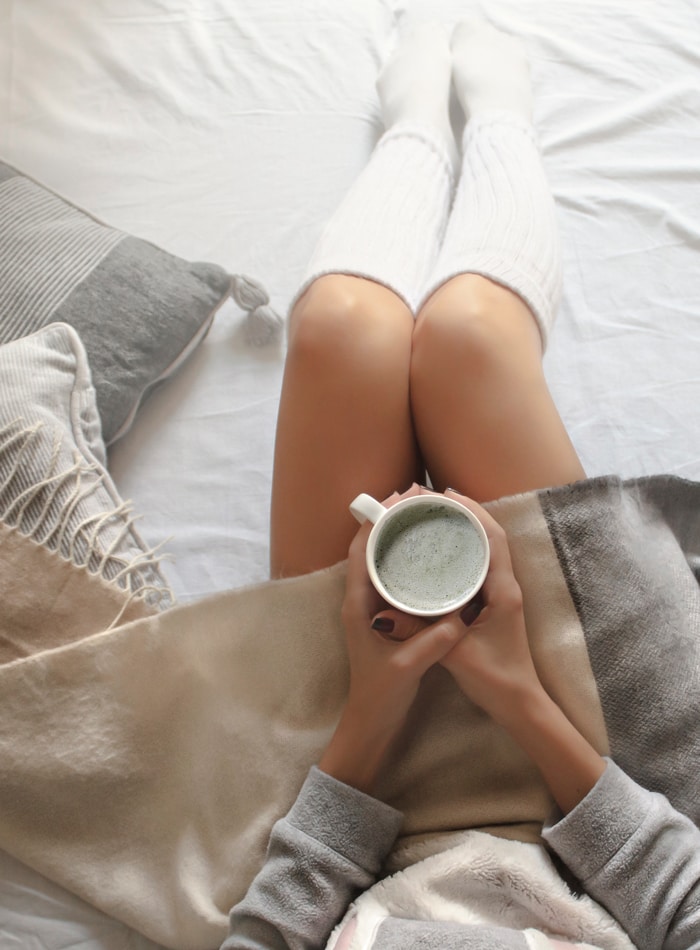
Important Nutrients for Sleep
There are a a number of important nutrients we need to optimize sleep. This list isn’t complete but it does include some of the most important good sleep nutrients. If you’re eating a wide range of whole foods, you should be getting most of what you need from your diet.
It may be helpful to add a few supplements to fill in the gaps but food first is always the best choice when it comes to getting these important sleep nutrients into your diet.
- Vitamin C. Get it from food first. Try camu camu berry, alma berry, bell peppers, green leafy veggies, kiwi, strawberries, citrus fruits, papaya.
- Calcium . Disturbances in REM sleep can be linked to a calcium deficiency, memory processing takes place in REM sleep. Bioavailable calcium can be found in kale, mustard greens, sea veggies, sesame seeds.
- Potassium. Eat bananas (moderate due to high-sugar content), green leafy vegetables, potatoes, dulse, avocado, criminal mushrooms.
- Selenium. Selenium deficiencies may play a role in sleep abnormalities. Plant-based sources included brazil nuts, sunflower seeds and cremini mushrooms.
- Tryptophan. Tryptophan is a pre-cursor to serotonin so it’s very important for good sleep. Plant-based sources included sweet potatoes, chia seeds, hemp seeds, bananas, pumpkin seeds and almonds.
- Omega-3. Promotes deeper sleep. Plant-based sources include chia seeds, pumpkin seeds, hemp seeds, walnuts and flax seeds.
- Vitamin B6. Important in modulating the stress response and helping to relax the nervous system. Plant-based sources include bananas, cashews, peanut butter, almonds, avocados, tomatoes, spinach, sweet potatoes and sea veggies such as kelp and dulse.
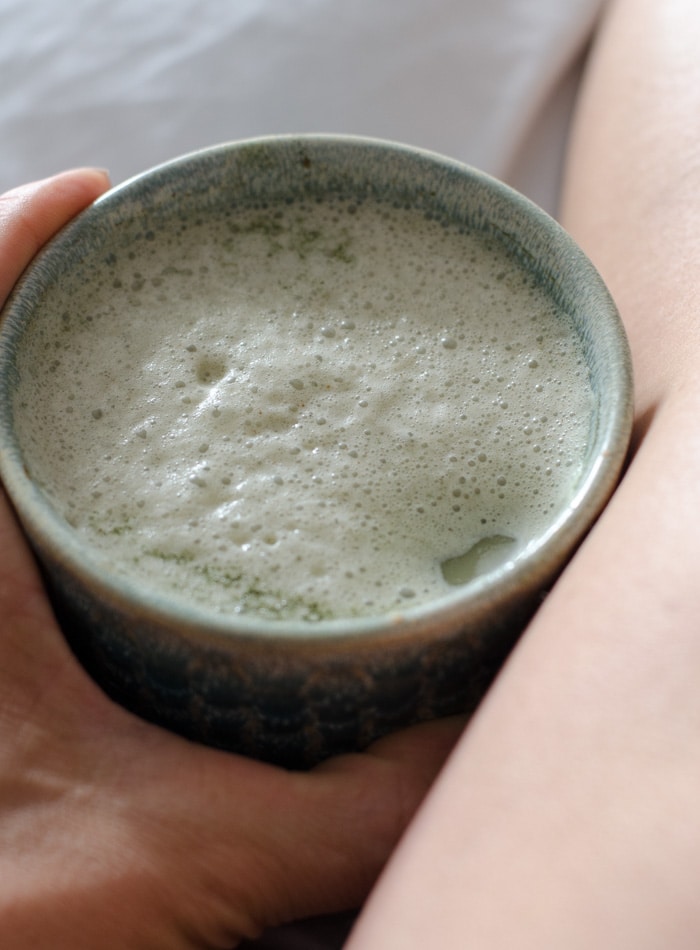
How to Create A Sleep Sanctuary
We went through a lot of this in my last post on sleep but let’s quickly re-cap how to create a sleep sanctuary. First of all, a sleep sanctuary is just what it sounds like: a calming, private sanctuary tucked away from the outside world. It should be a space where you can wind down, spend quality time with your partner, and of course, rest and rejuvenate with good quality sleep.
We are creatures of habit and our environment plays a role in determining those habits. You want to your bedroom to be an environment that promotes good sleep habits. We spend 1/3 of our life in our sleep environment, so it’s important to make sure that environment is the best it can be.
Here are a few ways you can create a sleep sanctuary:
- No electronics allowed. Phones out, TV out, laptop out, digital alarm clock out, get those EMF-emitting devices out of the bedroom. Don’t keep your phone charging right beside your head and ditch the electronic alarm clock for an old fashioned one, or continue to use your phone for an alarm like I do but keep it in another room loud enough to wake you up. To take this to the next step, turn off your WiFit at night too. As for TV right before bed, it’s too stimulating. All those bright lights and data coming in through our optical receptors is not conducive to a good night’s sleep.
As far as bringing electronics into the bedroom, for me it’s a big no-no. First of all, melatonin can be suppressed by too much electronic use and bright lights before bed. I would recommend setting a standard of no electronic use after 8 or 9 pm, depending on when you go to bed. I go to bed around 9 pm, so electronics get powered down at 8 pm. Allowing electronics in the bedroom can also tempt us to bring work to bed with us. This can effect our sleep and our relationships. Keep your work out of the bedroom and focus creating your perfect sleep sanctuary away from the stress of everyday life.
- Make it black. Both our eyes and skin is affected by too much light at night, our skin has photoreceptors that pick up light confusing our systems as to whether it’s time to get up or time to sleep. Light of all types can confuse the body into producing daytime hormones when we should be producing melatonin. The blacker you can keep your bedroom, the better.
- Calming decor. Think cool, calming colours and simple, welcoming decor that makes you feel relaxed and at home.
- Get some greenery. I recommend keeping a snake plants and English Ivy in the bedroom for their excellent air-filtering properties.
- Keep it clean with good airflow. We want to promote good air in the bedroom so our breathing and immune systems don’t have to work on overdrive. Keeping the windows open and a fan going can help circulate air. It’s also important to have a non-toxic mattress.
- Keep it quiet. Use a fan or white noise machine to drown out any noises that might wake you up throughout the night.
- Support your spine. Reduce sleep-related pain with a good quality mattress that’s right for your body.
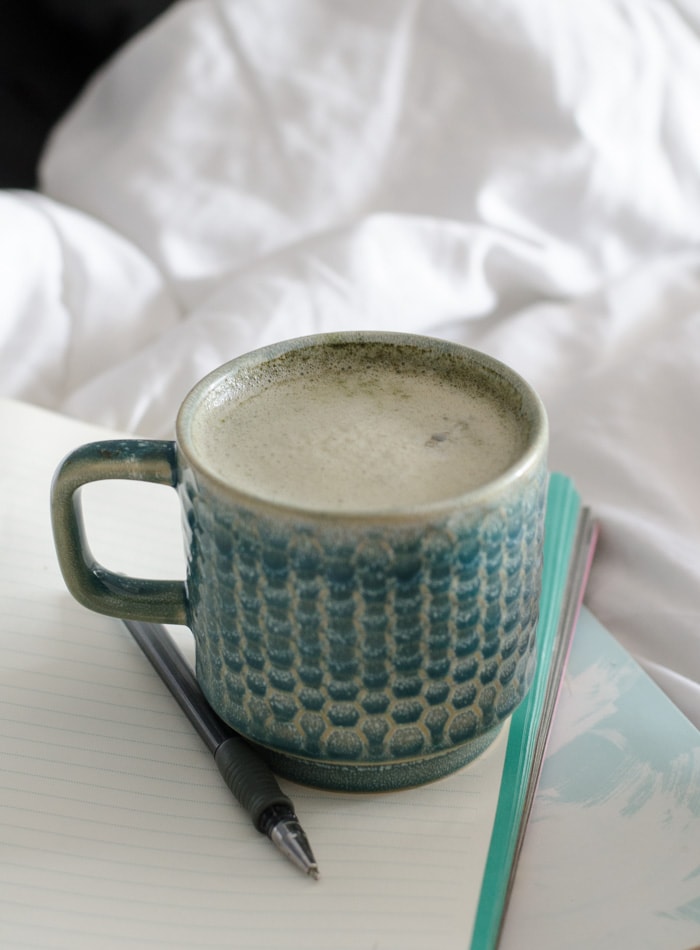
Natural Sleep Aids
We looked at some natural sleep aids in my Sleeping Well: Tips for Better Sleep post but today we’re going to get a little more into detail about natural sleep aids and adaptogens you can include in your diet to help promote deep, quality sleep.
- Passion Flower. Among other benefits, passion flower has been shown to improve sleep. Combined with valerian root it may be one of the best combinations to help with insomnia. May also help reduce anxiety and promote a calming, relaxed state. Can be found in tea or passion flower extract.
- Valerian Root. Used to treat insomnia, anxiety, muscle and join pain, depression, stress and more. Can be found in tea or valerian root extract.
- Reishi. A potent fungus that reduces anxiety, modifies immune system, has anti-inflammatory properties, is antibacterial, anti-again and sleep promoting, to name just a few of its benefits. Can be taken in a powder or capsule. I recommend Four Sigmatic Reishi Elixir, I love it!
- Ashwaganda. Helps the adrenal system regulate hormones so the body can better cope with stress. Induces sleep and a feeling of calm.
- Magnesiun. A key sleep nutrient that many people are deficient in. Easy to take as a powder or capsule. Try Natural Calm for an evening calming drink.
- Rhodiola. Can modulate the body’s production of stress hormones and help balance hormones overall all. High levels of stress hormones can interfere with our ability to fall and stay asleep.
- Shisandria. Can help slow down a racing mind, reducing stress and anxiety, helping you to relax. Studies have shown extended sleep time, faster time to fall asleep and deeper sleep. Thought to help reduce night sweats and restless leg syndrome as well.
- Eleuthero or Siberean Ginseng. Good if you have high-stress levels, whether physical or mental, and need extra recovery. Aids in anxiety and depression, balances hormones, all of which helps us sleep better.
Those are just a few samples of adaptogens that can incorporate as natural sleep aids. There are a ton of others that can help you slow down when you need to slow down, and give you a boost when you need a boost. You can check out this book if you’re intersted in learning more about which adaptogens might be right for you.
I like to rotate through ashwaganda, rhodiola, holy basil and eleuthero.
Relaxing Reishi Elixer Recipe
Blend the follow on high until smooth, creamy and frothed. Alternatively, use an electric handheld milk frother to froth it in a mug.
- 1 packet Four Sigmatic Reishi Elixir
- 2/3 cup just boiled water
- 1/3 cup almond milk
- 1/4 tsp chlorella
- 1/4 tsp ashwaganda powder
- liquid stevia to taste (sub 1-2 tsp of maple syrup, agave or raw honey)
- 1-2 tsp coconut butter, MCT oil or coconut oil (creates extra froth and creaminess)
- optional: a few drops of passionflower and/or valerian root extract
My golden milk or simple ginger turmeric tea also work well for a calming, evening drink.
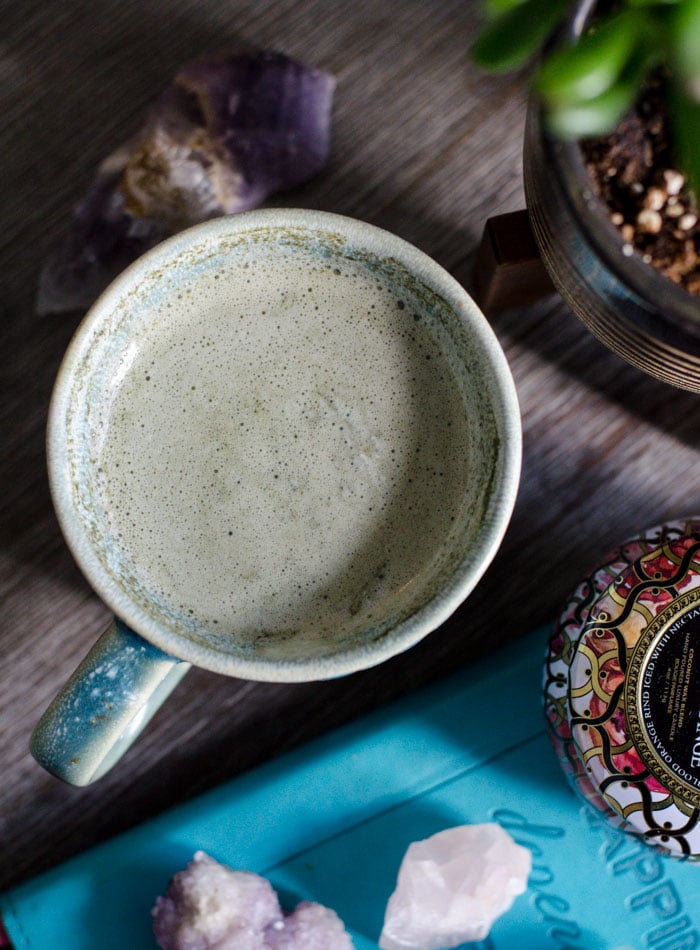

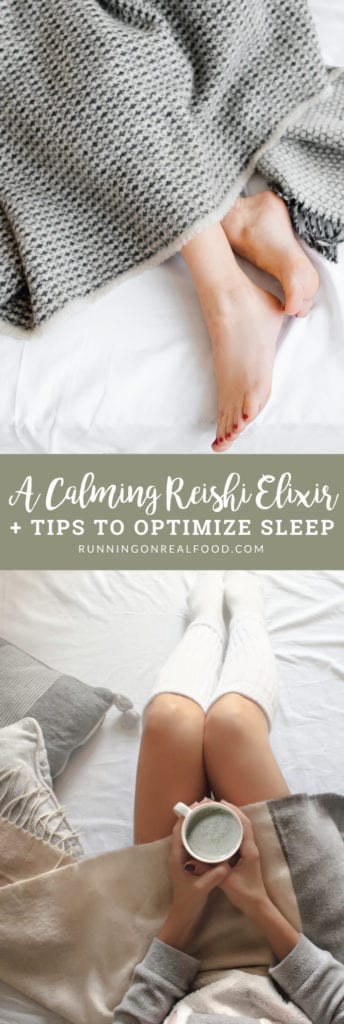







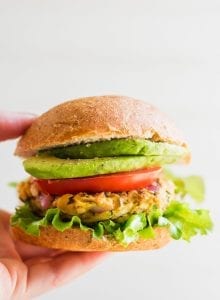
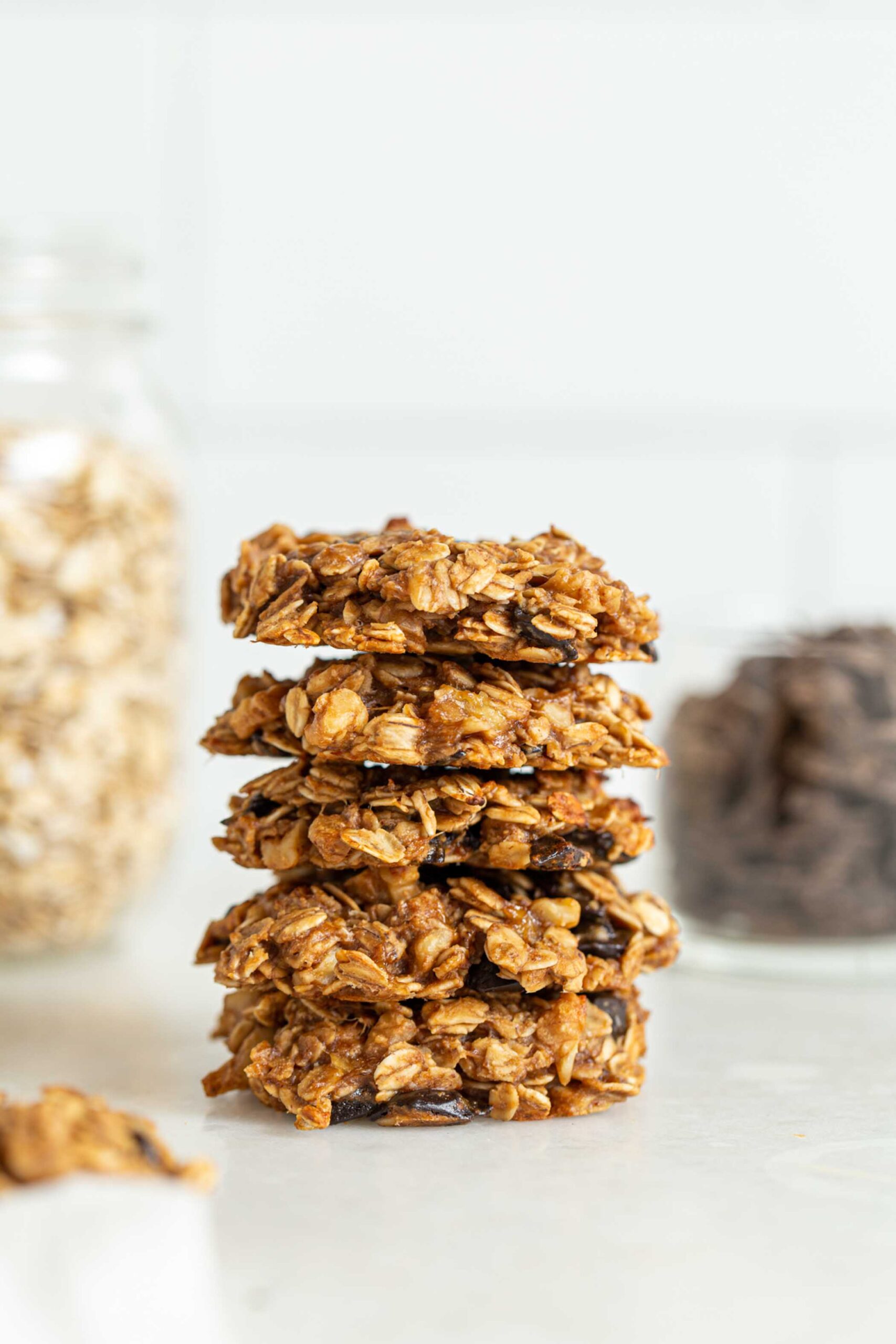




I take Rhodiola when I want to stay up all night, not for a sleep aid. Have you ever actually taken Rhodiola and gone to sleep?